As a web site which tries to keep its readers in touch with what’s happening on the winter boards; it’s remiss of us not to have spoken before now to Britain’s greatest ever Six Day rider – Tony Doyle, MBE.
Other ‘Brits’ rode the ‘races to nowhere’ – Tony Gowland even managed to win two Six Days (off 31 starts); London (with Patrick Sercu) and Montreal with (Gianni Motta).
Nigel Dean and Hugh Porter both rode the winter boards – whilst Maurice Burton forced his way into the inner circle, starting 46 Six Days and riding with honour, but never pulled off a win.
Doyle won 23 Six Days off 139 starts, finishing 128 of those races; 19 (off 35 starts) of these wins were with Australian Danny Clark, making them the third most successful team in the history of Six Day racing in terms of wins behind Risi/Betschart on 37 (130 starts)and Killian/Vopel on 29 (48 starts).
Doyle/Clark also took 15 second places and 11 third places
We actually caught up with Tony earlier this year, but by the time we got round to putting a piece together Het Nieuwsblad had come along – and then it was the Classics season, and then the Giro…
So, without further ado, here’s what Britain’s best ever Six Day rider had to say to VeloVeritas.
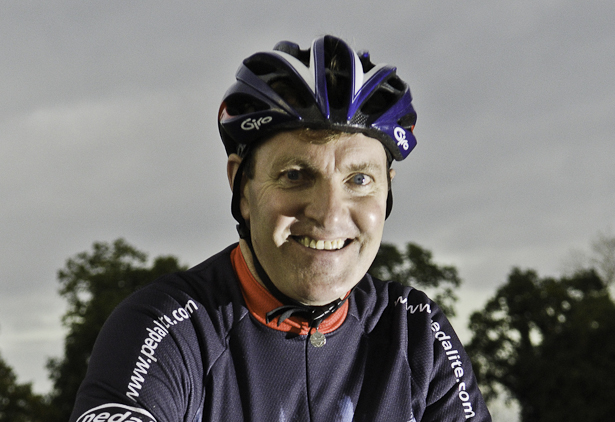
Thank you for taking the time to speak to us, Tony – first question; why the Six Days, you were a strong road rider?
“When I was over racing in France as an amateur in 1979 I picked up 13 wins and was offered a pro contract; but I decided I wanted to wait until after the Moscow Olympics before I turned professional.”
Moscow, the Olympics 1980 – that was a saga for you, wasn’t it?
“I’d call it a fiasco!
“Jim Hendry was in charge of the team and Willi Moore was the track coach. In their wisdom they decided – and this is three days before we’re due to race – that there should be a ‘ride off’ between Sean Yates and myself to see who gets the Games spot.
“Then, as it is today, there was only one slot available per nation for the individual events at the Olympics. We duly rode – under race conditions – and I was comfortably fastest with a personal best and British record.
“This simply endorsed that I was in good shape and in contention for a medal. Sean and I rode back to the Games village with no hard feelings.
“But then Jim Hendry spoke to me and said; ‘me and Willi have made up our minds – Sean is getting the spot.’ So what was the point of the ‘ride off?’
“To this day I’ve never got to the bottom of that decision.
“Sean qualified but was beaten in the quarters; he was younger than me and less experienced – I think I’d have coped with the pressure much better. And I think the rides left him tired for the team pursuit, which came two days later.
“The team was me, Sean, Malcolm Elliott and Glenn Mitchell. We qualified with a world record (their record was subsequently broken several times over the course of the qualifying round, ed.)
“In the quarters we were against the Italians and Sean was dropped after his first spell – that left us with three riders.
“Malcolm was young and having to do the extra spells took a toll – by the finish he was struggling.
“Hendry’s decision cost me and the team our medal chances – I’m sure of that.”
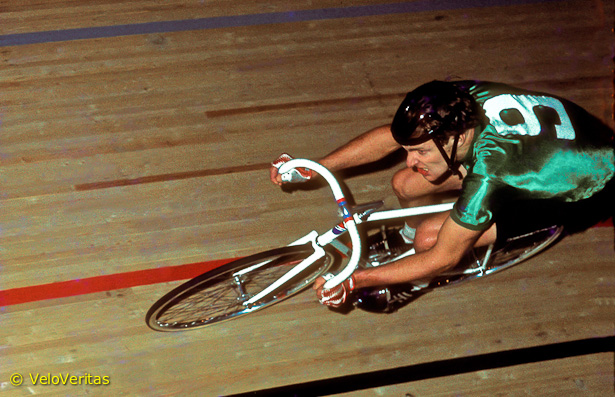
I remember it all being big news at the time.
“There was uproar, but rather than get on my soapbox I trained even harder – I found it therapeutic after the disappointments of Moscow.
“There was no point in brooding. I turned pro, won the British pro pursuit title and two weeks later was in Besancon and won the Worlds. I beat Ponsteen in the final and Orsted – who took bronze in Munich – was third, again.
“The world title was my route into the Six Days – I was hot property.
“My first race was in London – the Skol Six Day.
“Then I rode Berlin and Dortmund and got a taste for the world of the Six Daysix days – even though I was getting my head kicked in!
“No Briton had cracked the Sixes and I wanted to be the first.”
Gaining acceptance is hard, isn’t it?
“When I turned pro I had it in the back of my mind that I wanted to ride in the Six Days – and the way events turned with my world title, I was able to ride a full season; nine races.
“When I was a kid I had posters of Danny Clark and Patrick Sercu on my wall – and here I was racing against them. In November I rode an omnium in Switzerland; the final event was the pursuit.
“Sercu – the boss of the Six Days – came to me before I was due to ride against him and said; ‘you’re going to beat me, but don’t make me look stupid, don’t catch me!’
“Freuler won the omnium, I was second and Sercu third – it was fantastic to beat him. When I got home I discovered they’d given me Sercu’s medal – I still have it!
“Sercu was a remarkable athlete – Olympic kilometre champion, world sprint champion, green jersey in the Tour and king of the Six Days.”
How did you come to partner with Danny Clark?
“In the ’83 Worlds at the Oerlikon track in Zürich I finished fourth in the pursuit – I was very disappointed with my series. But I rode a good points race despite the fact that I was the only Briton against three Swiss. The Suisse Franc carried a lot of clout and Freuler paid off the combine against me. I was fifth but it was accepted that I’d been the best rider on the track.
“There were a lot of promoters there – Otto Ziegler for instance, he ran Berlin and Dortmund – and they saw how I’d ridden. Don Allan had just retired and they were looking for a new partner for Danny Clark – I was young and on the way up, so I got the ride.
“We won Berlin and Dortmund in ’83 – which was a great start to our partnership.
“We’re still friends and exchange emails at Xmas and New Year – but he was a tough, ruthless character who lived on his nerves. I was calmer than Danny, more relaxed, he was hyper; he always thought that people were out to get him.
“But our characters complimented and on the bike we were both very aggressive; Danny the sprinter, me the pursuiter – ideal! We were the team of the 80’s with 19 wins – and if we’d had the chance to have ridden more, we’d have won more.
“The roots of the Sixes were in Germany, though – half of the calendar took place there. For us as a Commonwealth team we had no Six Days promoters behind us – there was no Skol six in London anymore and no pro sixes in Australia.
“The likes of Pijnen the Dutchman and Thurau the German had the promoters in their corner. In 1988 we started five German Six Days and won them all – Munich, Berlin, Dortmund, Munster and Bremen.
“After that we only rode together another three times – the promoters said we were too strong to ride together as a team.”
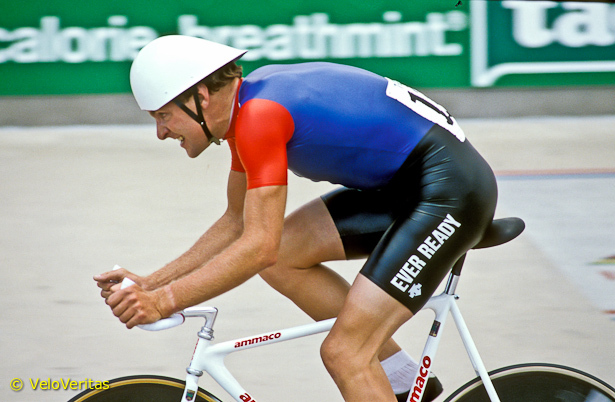
In ’89 your career almost ended, didn’t it?
“That was in Munich, the Russian rider, Ganeev cut across me and took me down – it was a terrible crash. I had brain trauma, but I don’t think people realise how serious that crash really was.
“I was in a coma with multiple fractures and the first aid people dropped me off the stretcher – when I got to hospital they gave me the last rites.
“But I was young and super fit, so I had a better chance than most.
“I was in a coma for ten days and for ten weeks after that I had no memory – then it was another ten weeks before I could walk or speak and do things like use a knife and fork.
“I pulled through – even tough I didn’t think it was possible.
“As I was coming towards the end of my recovery, I went to see a neurologist in Harley Street for a final assessment.
“‘You must know that chap, Tony Doyle?’ he said to me – on my files it said Anthony Paul Doyle MBE – ‘I had to go and see him twice whilst he was in hospital?’
“When I told him that was me, he couldn’t believe it; he said that no one could make such a recovery from those injuries – he reckoned it was a miracle.
“I went back to Munich one year after the crash – and won it; I’d place that as my greatest achievement on the bike, above winning the world titles. The doctors and nurses in the hospital in Munich had looked after me so well that I went back to see them, to say, ‘thank you.’
“The nurses recognised my wife, but not me, they said; ‘that’s really nice that you’ve come all the way from London to see us.’
“When I said that I was there for the Six Day, they thought I meant to spectate – when I said I was there to ride, they didn’t believe it.
“In the end I got them all tickets for the final night.”
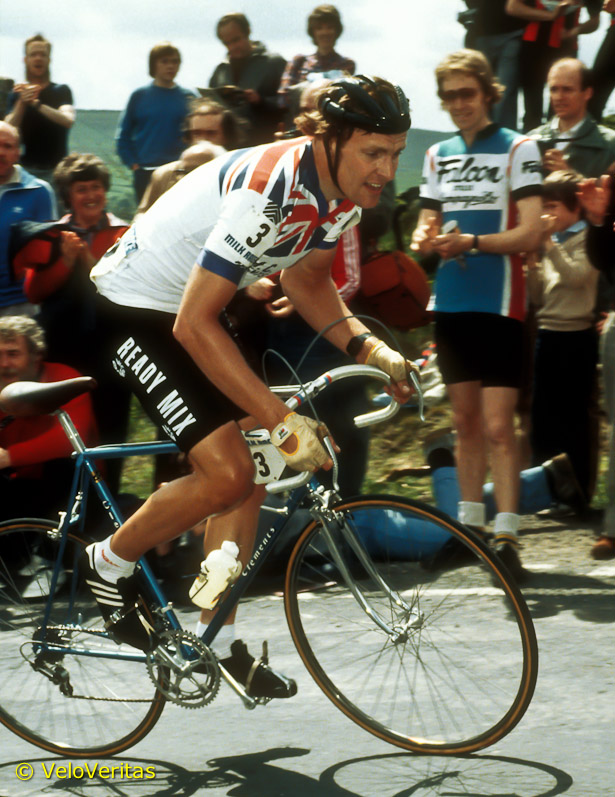
Munich was the ‘Six Day World Champs,’ wasn’t it?
“It was the Wimbledon of the Six Days, superbly organised, a fabulous atmosphere and very competitive – to win there put you on a pedestal.
“In Zürich the racing lasted longer into the night but the contracts were better for Munich and everyone fought to get a ride – then battled for the podium.
“It’s very sad to see it gone – it was a fantastic venue, a great crowd, great ‘speaker’ and a great field.
“Sigi Renz was the race director – he was the Alex Ferguson of his trade – and knew everything that was going on.
“It was my favourite Six Day; I liked Berlin, Dortmund, Rotterdam – and Bremen was like racing at Old Trafford, a great atmosphere, too.
“But Munich was definitely Wembley!”
The circuit was tough back then, wasn’t it?
“To be a success – and for a while the leader of the Blue Train (the group of elite Six Day riders, the name comes from a luxury train in South Africa, ed.) you just had to get on with it.
“You had to accept the conditions and do your job; there was no point in spending time moaning – you’re a professional.”
You must have been tired when you finished the Six Day season?
“I rode 14 Six Days, one season – that’s a very heavy winter.
“I had chances to ride with the big pro teams but it would have been too much after a winter on the Six Day circuit.
“That was why I raced in the UK, I could compete a couple of times each week; but I was making much fewer demands on my system than I would have been racing on the continent, riding Grand Tours and the like.
“And it meant I was home for the summer, keeping competitive and tuned – but not too wearing. The start of my build up for the Worlds was really the start of me preparing for the Six Day season.”
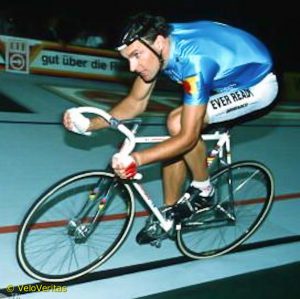
Why did you stop?
“In Zürich in 1994 I had a bad crash, the German rider, Messerschmitt took me down and I suffered fractured vertebrae and compressed discs.
“I remember laying there with the race swirling around me – Voegli, the race director didn’t stop it for me to be attended to.
“I recovered well and rode a madison in San Sebastian in February, then I rode the European madison championship with Rob Hayles.
“I was getting all sorts of treatment and therapy but there was just too much pain in my lower back.
“If I was pottering, it was fine, but when I was going hard it was very painful – really it was stop or end up crippled.”
The Worlds – you should really have won three world pursuit titles, shouldn’t you?
“I won the title in ’80 and ’86 and was coming in to the ’88 series on the outdoor track at Ghent with good motivation – my preparation had all gone well.
“Two world titles are good; but I think that three is really special.
“I was riding for Ever Ready-Amaco in the UK and had a brought together my support team for the championships. Those were the days of professional and amateur Worlds and if you were a pro then British Cycling left you to look after yourself.
“I had my Six Day soigneur with me – Pierrot De Witte; he lived in Brussels and having him there meant a lot to me. Mick Bennett was there as my manager and we had a mechanic, Derny driver and psychologist to complete the team.
“I qualified fastest, won my quarter final, won my semi final then did my warm down on the rollers before going back to the massage cabin, which was about a kilometre away from the track. The final was later in the day and I wanted to switch off then warm back up again.
“I was meeting the Pole, Lech Piasecki in the final; he was a good rider – he wore the yellow jersey in the Tour – but I knew I was faster than him in a five kilometre pursuit.
“I had all my timings planned meticulously around a 2:30 pm ride – but unknown to me, the organisers had changed the schedule to a 1:15 pm final.
“The first I knew was when my Derny driver, Paul Wingrave burst into the cabin and said; ‘you’re on the track in a few minutes!’
“I rushed to put my skinsuit on – it was a rubberised Descente job which required talc to get it on – and set off to the track on my road bike. The last thing I said when I left the cabin was; ‘remember my spare skinsuit!’
“I arrived at the track as the ride off for third and fourth was taking place and had to go straight on to the track without a warm up.
“I needed to help to get zipped up into my skinsuit but Mick and Pierrot were panicking and the zip broke. And of course, no one had brought my spare skinsuit.
“With the benefit of hindsight, we should have explained the situation to the commissairs and gone for the spare suit whilst I sat on the rollers.
“But instead they safety-pinned up what was a seriously expensive suit.
“When the ride started I just couldn’t get my composure; it was my fourth final and I won two of those – but it was Piasecki’s first time in that situation. As well as the psychological aspect, physically I just wasn’t warmed up – if the final had lasted another 1,500 or even 1,000 metres then I’d have beaten him as I was coming into my stride.
“Or if I’d had 10 or even five minutes on the rollers before the race then that would have been enough – as it was, I felt like my third world title had been snatched out of my palm due to poor management.
“My team should really have been aware of the programme change.”
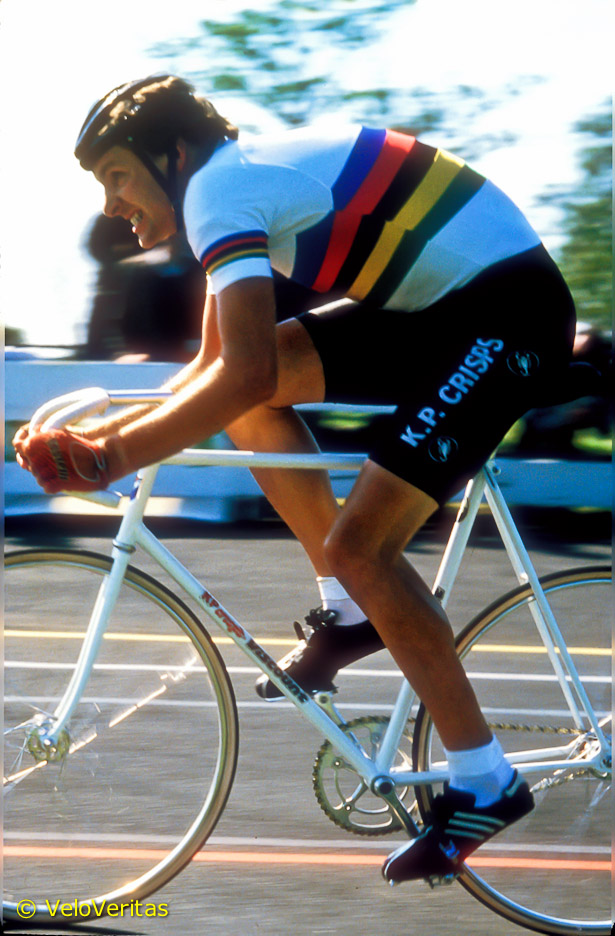
You and Hans-Henrick Oersted battled for the rainbow jersey all through the 80’s.
“Hans-Henrik and I go back a long way – to when we both raced as amateurs in Trinidad in 1977.
“Despite our rivalry on the track, we were good friends off the bike.”
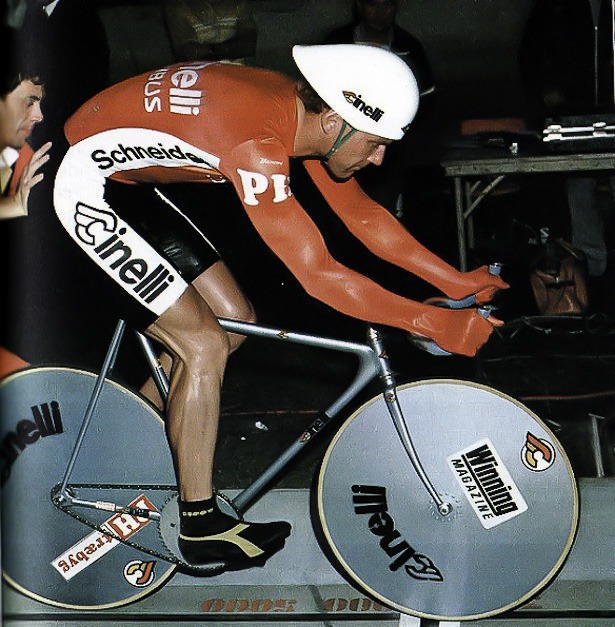
Did a world title make a big difference to your contract fee?
“I was an established member of the Six Day ‘Blue Train’ latterly, but the rainbow jersey did help you get a few more D Marks, yes.”
You were a close second to Freuler in the pro points in championship in ’87.
“That was in Vienna; as the race went on I felt better and better.
“The problem was that it was hard to keep track of the points situation – the announcer had a very thick accent and I couldn’t make out what was coming over the PA system.
“It was all down to the last sprint; but I didn’t realise that and didn’t think I could win – if I’d known how close it was then maybe I could have dug deeper…”
Tell us about your Commonwealth Games silver medal in 1994.
“I won two bronze medals at the Commonwealth Games in ’78 – individual and team pursuit. But once I turned professional, I couldn’t ride the Games; then in 1993 the sport went ‘open’ – there was no distinguishing between professionals and amateurs.
“By 1993 I’d finished with individual pursuiting, but I said to Doug Dailey (former British road race champion in charge of the GB track squad at the time, ed.) that I’d like to ride the points race.
“I was gobsmacked when he selected two amateurs – Simon Lillistone and Paul Jennings – instead of me.
“However, I did ride the World Elite Road Race Championships that year – the one won by Lance Armstrong – in Oslo; it rained the whole day and the roads were treacherous – but I did finish!
“Going into ’94 I thought that being on the Games squad would be good for my motivation and I used the team pursuit as an objective – my individual pursuiting days were at an end.
“We won silver and it was a good stepping stone on my way to the winter season.
“I raced on the road in the US, UK and South Africa and produced some good rides. I went into the ’94/95 season really well prepared – Patrick Sercu, who was by now in charge of the Six Days, said to me; ‘the Old Tony is back!’
“I replied that if I was a horse I’d have been shot by now – then of course I had that final bad crash.”
Do you see many Sixes, these days?
“A couple, I try to make Rotterdam and Copenhagen, at least.”
You’ve been working on a London Six Day?
“I’d very much like for a London Six Day still to happen – but we need a permanent venue.
“A temporary track really complicates the logistics.”
Why have the Six Days declined in recent years?
“It’s partly down to the economic climate, but also the fact that there are so many things for folks to do – there’s internet, social media, satellite TV…
“Live sporting events are so expensive these days – but you can watch on the internet for free.
“Sponsorship money is tighter so the promoters need to try and make more money on the gate and charge more.
“And starting a Six Day from ‘cold’ is a daunting prospect; it requires so much more effort.
“There’s perhaps been a bit of a revival, but there are only two Six Days in Germany – it was the heart of the scene.
“The changes on the road haven’t helped, the riders get paid so much now; and the chase for UCI points is so relentless that Directors are unwilling to let riders risk injury riding in Six Days.
“I was fortunate that in my era riders like Fignon, Roche, Mottet, Argentin and Moser rode the Six Days and brought the fans in.
“There’s not the lure of the big road riders, now – Zabel had a huge following and when he stopped, it left a void.”
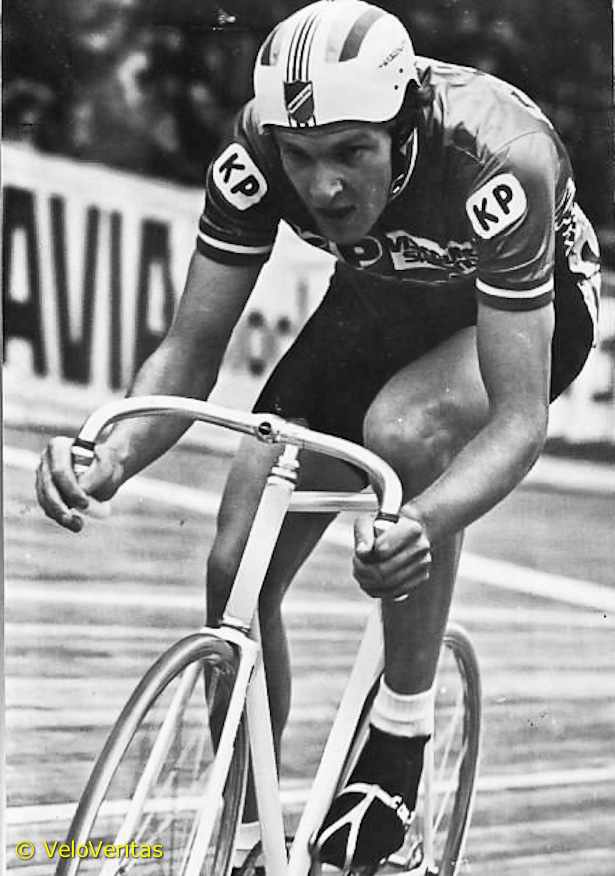
When you look at the support team GB gets now, are you a little envious?
“Not really, I made the best of things and built my own support system.
“There’s certainly a lot more money around British Cycling due to lottery funding and that makes a huge difference.”
What do you do, now?
“I’m still very much involved in cycling – I work with Nike on their sponsorships with ASO and with individual riders like Mark Cavendish and Nicole Cooke.
“I’m also involved in sports marketing with IMG as well as projects to develop youth cycling – so I’m kept busy.”
Regrets?
“I’ve been very fortunate and successful – so no major regrets, no.”
With thanks to Tony Doyle MBE for his time, the use of his photographs, and courtesy.



